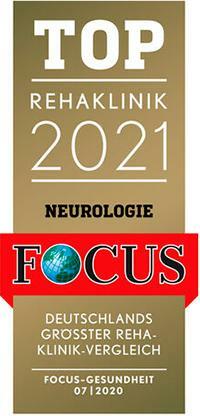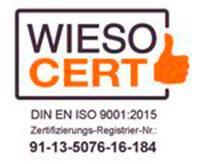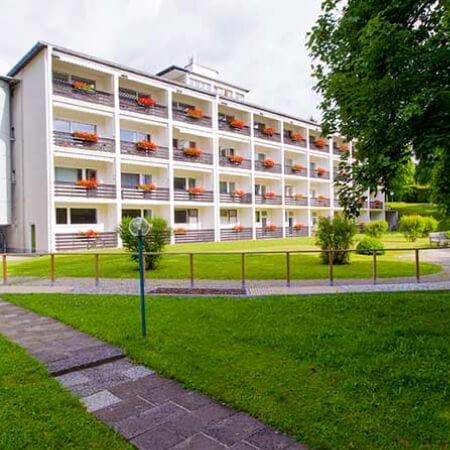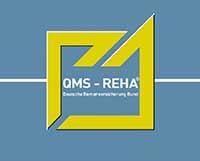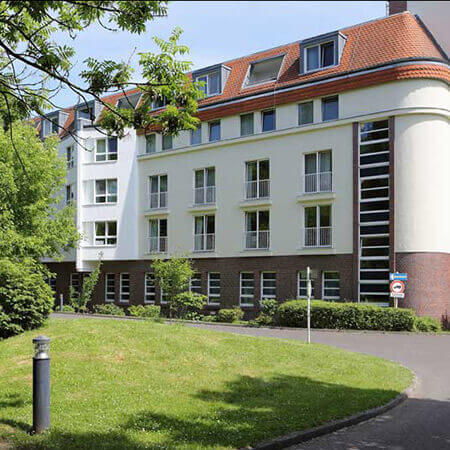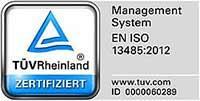Neurological rehabilitation is a set of measures to restore brain functions lost as a result of disease or injury. It lasts several months. The rehabilitation results in the improvement of the motor, intellectual, speech and other functions of the central nervous system. Eventually, a person is less dependent on other people in everyday life. Many people manage to regain not only self-care skills, but also to return to an active social and professional life.
To undergo rehabilitation, you can visit one of the European countries. If you choose Europe for rehabilitation, you will benefit from high quality recovery with the use of the very latest techniques, good service, comfortable conditions, high quality care and supportive therapy.
Content
- Who needs rehabilitation services
- Rehabilitation phases
- Rehabilitation options
- Stroke rehabilitation
- Rehabilitation methods
- Use of training equipment for rehabilitation
- Why is it worth undergoing neurological rehabilitation abroad
- Rehabilitation abroad with Booking Health at an affordable price
Who needs rehabilitation services
Neurological rehabilitation services are essential for patients with brain, spinal cord, or peripheral nerve injuries. These injuries are usually caused by one of three causes:
- Diseases – stroke, degenerative pathologies, inflammatory brain diseases.
- Traumatic injuries – the brain is injured as a result of traumatic brain injuries, spinal injuries.
- Previous surgical interventions and minimally invasive procedures – for example, removal of a brain tumor.
The main neurological disorders and symptoms for which the patient requires neurological rehabilitation include:
- Muscle weakness or increased muscle tone.
- Pain.
- Difficulty walking.
- Difficulty with activities of daily living: dressing, bathing, using the toilet
- Difficulty swallowing.
- Speech disorders.
- Impairment of cognitive functions.
- Visual impairment, double vision.
Lack of rehabilitation leads to disability and premature death of a person. The person needs care of other people and spends most of his life sitting or lying down. This results in muscle atrophy, limited joint movements, impaired blood circulation, development of blood clots, and bedsores are very likely to occur.
To prevent the above conditions, it is worth starting neurological rehabilitation as early as possible. The best results can be achieved within the first 6 months. After this period of time, the possibilities for brain recovery are limited.
Rehabilitation phases
Rehabilitation in Europe takes place in 7 phases:
- A – inpatient rehabilitation, which begins immediately after surgery or the development of a severe neurological disorder. It lasts up to 2 weeks. During this period, many people require not only rehabilitation, but also intensive treatment.
- B – it lasts up to 1,5 months after a stroke or other disease (injury, surgery). During this period, the most important task is to improve the patient's physical condition, sensory and motor functions.
- C – the main and the longest phase. Rehabilitation activities are continued until the full achievement of the rehabilitation goals. Depending on the patient's condition, this may be the restoration of self-care skills and the disappearance of the need for constant care of others, a return to social life, work, etc.
- D – a return to active life.
- E – social rehabilitation, employment.
- F – long-term care.
Foreign patients usually visit hospitals abroad and rehabilitation centers to undergo phase B and C rehabilitation.
Rehabilitation options
As a branch of science, neurological rehabilitation has formed relatively recently. In the twentieth century, most patients did not receive any rehabilitation therapy after suffering neurological disorders. It was only in 1996 that the first World Congress on Neurological Rehabilitation took place in the UK. Now they are held regularly, namely once every 3 years.
As of today, it is one of the main treatments for neurological disorders. Rehabilitation helps the patients improve brain function and slow the progression of pathology. With the advent of new technologies, its results are constantly improving.
Here are some of the basic principles of rehabilitation:
- Earlier initiation of rehabilitation measures – as soon as the patient's consciousness is restored, and sometimes even earlier.
- Comprehensive approach – the simultaneous restoration of all lost functions.
- Individual development of a program for each patient.
- Stages and continuity.
- Regular diagnostics and monitoring of loads.
- Social orientation: the results of rehabilitation must achieve particular goals, which improve the quality of life of both the patient himself and his relatives, on whom the burden of caring for the patient will be reduced.
As a result of neurological diseases, some of the nerve cells die off. They can no longer perform functions. The possibilities for brain regeneration are limited. Nevertheless, significant progress can be made with high quality rehabilitation. It can be achieved due the following:
- True recovery – regeneration of nerve cells.
- Activation of nerve cells, which were not previously used.
- Formation of new pathways for conducting impulses bypassing damaged areas.
- Performance of the functions of the damaged center by neighboring neurons.
- Acquisition of skills by the patient to adapt to the existing neurological deficit.
Stroke rehabilitation
There are hundreds of neurological diseases for which a person may need rehabilitation. These are amyotrophic lateral sclerosis, meningitis, diabetic neuropathy and encephalopathy, tumors, brain aneurysms, etc. However, most of these pathologies are rare.
Stroke is more common. This is one of the main causes of human death and disability. Therefore, most patients undergo neurological rehabilitation after a stroke. This disease has the following consequences:
- 80% of patients develop movement disorders.
- 70% of patients develop chronic pain.
- 60% of patients develop cognitive disorders.
- 50% of patients need care from other people, as they cannot take care of themselves in everyday life.
- 20% of patients have speech disorders.
In medical centers in developed countries, people with stroke begin their rehabilitation almost immediately after the development of this pathology. The health care system in European countries is aimed not only at achieving good survival rates for patients, but also at their rehabilitation, return to active life, and, if possible, to work. At the very least, stroke survivors should not need constant care from other people. It is even better if they manage to regain social ties and professional skills. Many people succeed in this: after a few months, the state of health improves, the neurological deficit decreases, and the person becomes more and more independent of the care from other people.
Rehabilitation methods
Doctors abroad use the very latest methods to restore the health of patients. The best hospitals in the world will offer you comprehensive care and the best services.
The well-equipped rehabilitation centers in Europe use robot-assisted training, virtual reality, neuromodulation, biofeedback, functional electrical stimulation, and non-invasive brain stimulation. All of these methods increase motivation of patients, improve brain function, help restore lost skills, or adapt to neurological deficits.
Rehabilitation begins as early as possible, even if interaction with the patient is not yet possible. Doctors use hardware verticalization with the help of turntables or special training equipment. As a result, patients begin to walk earlier and have better motor skills even in the long-term period – 1 year or more after the disease.
To eliminate paresis, robot-assisted equipment is used. It is an alternative to conventional physiotherapy exercises, but it is more effective. Robots help train precise movements of the particular parts of the body. Biofeedback and virtual reality are used to measure progress and increase motivation.
Even in deep paresis and paralysis, specialists abroad manage to improve a person's mobility. They use peripheral stimulation – a stream of impulses is directed to the muscles. They activate the sensory and motor centers in the brain, forcing them to restore and develop.
For neurological disorders, doctors abroad use non-invasive transcranial magnetic stimulation of the brain. The technique is especially effective for improving speech, swallowing, and space perception. It helps to restore motor functions faster and better.
Other rehabilitation methods may include:
- Kinesitherapy.
- Massage.
- Botulinum toxin injection.
- Reflexology.
- Sessions with a speech therapist-aphasiologist.
- Occupational therapy.
- Household skills training.
- Breathing exercises.
- Drug therapy.
Use of training equipment for rehabilitation
The basis of neurological rehabilitation is the restoration of mobility. Patients work out on special training equipment, which increase muscle strength, increase the overall tone of the body, train certain movements and stimulate the regeneration of nerve tissue. Neurorehabilitation centers abroad use medical devices for practicing both local movements, for example, restoring hand motor skills, and devices for improving global motor acts, such as walking.
The main types of medical training devices used in Europe are:
- Mechanical devices, including robot-assisted ones – they act mechanically on certain parts of the patient's body, stimulating the work of muscles and joints.
- Force plates (platforms with unstable support) – they train a person's stability in an upright position, develop the vestibular apparatus.
- Generalized impact devices, including robotic suits – they use mechanical pressure, anti-gravity action, force, axial, proprioceptive action is applied in proprioceptive correction suits (restores deep tissue sensitivity).
- Hybrid medical training devices, which combine multiple functions, often with biofeedback and virtual reality.
Medical specialists in Europe also use the very latest training equipment with BCI (Brain-Computer Interface). It provides feedback based on recording the electrical activity of the brain.
Why is it worth undergoing neurological rehabilitation abroad
You can get high quality therapy services abroad. The best doctors in the world will take care of your health. Specialists from various medical fields take part in the rehabilitation process, namely neurologists, physiotherapy specialists, rehabilitologists, physiotherapists, speech therapists, neuropsychologists, massage therapists, etc., depending on what brain functions are impaired and what medical services are needed to restore them.
Rehabilitation programs are selected individually. The level of physical activity constantly increases to maintain progress in the restoration of mobility. Doctors are in constant contact with the patient. They monitor his health to avoid complications.
Both high-quality services and comfortable conditions await you abroad. Rehabilitation is a long process, but the progress achieved and the constant care will motivate the patient for further work, so most patients receive good results at the end of the program.
There are several reasons for you to undergo neurological rehabilitation in Europe:
- State-of-the-art equipment in rehabilitation centers.
- Rehabilitation programs worked out over the years.
- Individual approach.
- Constant care, high quality services and comfort.
- Procedures are safe for health.
- Interdisciplinary collaboration of specialists providing the best results.
Rehabilitation abroad with Booking Health at an affordable price
To undergo rehabilitation after suffering neurological diseases in one of the best neurorehabilitation centers in the world, please use the services of Booking Health. On our website you can see the cost of neurological rehabilitation in different hospitals, compare prices for medical services and book a medical care program at an affordable price. Rehabilitation treatment in the European neurorehabilitation center will be easier and faster for you, and the cost of the medical care program will be lower.
Booking Health will organize your trip for neurological rehabilitation abroad. You will benefit from the top-class services. We will provide the following benefits for you:
- We will choose a neurorehabilitation center in Europe, whose doctors specialize in the treatment of neurological disorders and rehabilitation of patients.
- We will help you overcome the language barrier, establish communication with your attending physician.
- We will reduce the waiting period for the medical care program and book a doctor's appointment on the most suitable dates.
- We will reduce the price. The cost of therapy and recovery in a rehabilitation center will be decreased due to the lack of additional coefficients for foreign patients.
- We will take care of all organizational issues and provide high-quality services: documents for entering the country, transfer from the airport, hotel, interpreting services, etc.
- We will prepare a program and translate medical records. You do not have to undergo previously performed diagnostic procedures.
- We will provide communication with the neurorehabilitation center after the completion of the medical care program.
- We will organize additional examinations and treatment in European hospitals, if necessary.
- We will buy medicines abroad and forward them to your native country.
- We will help you keep in touch with the neurorehabilitation center.
Please leave your request on the Booking Health service: indicate your diagnosis, attach medical records and leave your contacts for communication. Our employees will consider your application and will call you within a few hours. They will help reduce the cost of neurological rehabilitation services and will take care of all organizational issues, and you will only have to focus on restoring your health.
Authors:
The article was edited by medical experts, board certified doctors Dr. Vadim Zhiliuk and Dr. Sergey Pashchenko. For the treatment of the conditions referred to in the article, you must consult a doctor; the information in the article is not intended for self-medication!
Our editorial policy, which details our commitment to accuracy and transparency, is available here. Click this link to review our policies.
Sources:
Cochrane Rehabilitation
Smart rehabilitation
MedlinePlus

